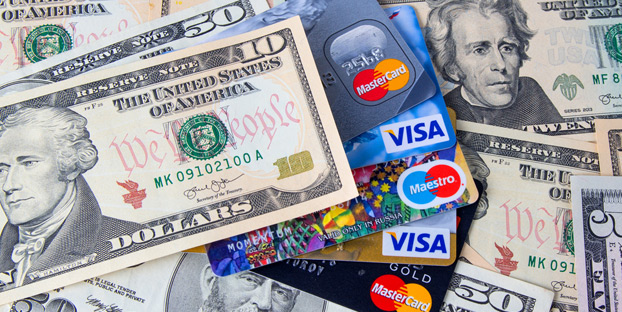3 Things to Know If Your Prepaid Card is Stolen
While prepaid cards offer a convenient way to spend, they’re not without certain risks. Today, I’m taking a look at why putting all of your cash onto a prepaid card can backfire if it ends up getting hacked.
Think you’re immune to getting hacked? Just last year alone, at least 16 big name retailers had their data breached and possibly had their private information stolen. Some of those big retailers included Macy’s, Arby’s, and Target.
According to a recent study by KPMG, 19% of consumers would not feel comfortable shopping at a retailer that had their personal information breached, and close to 70% of those polled said that the reason they would not shop there again had to do with the company’s failure to prevent future attacks.
I strongly suggest having a back-up account to your prepaid card… here’s why:
1. You may be responsible for paying back the stolen amount.

If someone steals your credit card information and uses it to go on a shopping spree, your liability for any fraudulent charges is limited to $50 under federal law.
When a regular debit card is compromised, the amount you’re liable for depends on how quickly you notify the bank that of the theft.
For example, if it’s reported within two days, your liability is capped at $50. If you wait longer than 60 days to report fraudulent charges, you need to pay back the full amount.
With a prepaid card, those same benefits generally don’t apply unless your card issuer specifically agrees to provide them.
The Consumer Financial Protection Bureau proposed extending federal debit and credit card fraud protections to prepaid cards, but it hasn’t happened yet.
If you’ve got your entire life savings on a prepaid card and a hacker gets their hands on your information, you’re basically out of luck when it comes to recovering it.
Did you know? In addition to lacking the same fraud liability protections, prepaid debit cards don’t offer the same dispute resolution avenues that are available to credit card users.
2. You’ll have to pay a fee to replace it.

To add insult to injury, you’ll have to hand over even more money to get a new prepaid card issued if yours is stolen. The fee can be anywhere from $4 to $10, depending on which prepaid company you use.
If you need to get a new card right away, be prepared to tack on another $15 to $25 for expedited shipping.
To give you an idea of just how expensive it is to have your prepaid card replaced if it’s hacked, we’ve included a break down of what some of the top prepaid providers charge.
Prepaid Debit Card Replacement Fees
| Card Issuer | Replacement Fee | Expedited Shipping Fee |
|---|---|---|
| AccountNow | $10 | $25 |
| BB&T Money Account | $5 | $15 |
| Chase Liquid | $0 | $5 |
| Green Dot | $5 | N/A |
| MyVanilla | $6 | $21 |
| PNC SmartAccess Card | $7.50 | $25 |
| NetSpend | $9.95 | $20 for 3 business days, $25 for 1-2 business days |
| Fifth Third Access 360° | $0 | $30 |
| American Express Serve | $0 | N/A |
3. You could be putting future deposits at risk.

One of the reasons prepaid debit cards get a lot of use is that they can eliminate the need for a regular bank account if you get paid through direct deposit.
Most prepaid cards allow you to set up direct deposit of your paycheck issued by an employer or any federal benefit payments you may receive.
Some cards, like AccountNow, even offer a cash bonus when you set up direct deposit.
The problem is that if you’re not paying close attention to your transaction history, you may not notice right away that your card information has been stolen.
In the worst-case scenario, you could check your balance one payday and find that your entire check has already been spent without your knowledge.
That’s also an issue if you set up your tax refund to be deposited directly to your card.
Yes, it’s faster and more convenient than waiting for a paper check to come in the mail but good luck trying to get Uncle Sam to reimburse you if an identity thief manages to drain your account once the deposit goes through.
Back-Up The Accounts You Need

You’re taking a big gamble by keeping all of your money on a prepaid card and even if it’s not stolen, there’s still the possibility that you could lose it somehow.
Maintaining a separate credit card or bank account is a better move than putting all of your eggs in the same basket.
Even if you prefer cash to using credit, having at least one card you can pull out in case of an emergency is a smart move.
Sure, you may end up paying interest on whatever you charge but you’ll at least have that reserve to fall back on if your prepaid card gets wiped out.
It’s also a smarter alternative to using a payday loan to cover the gap, since these products can charge interest rates as high as 400 percent.
The other option is to set up a separate checking or savings account that you can draw from if you need to.
Doing so gives you the added peace of mind of having a cash cushion to fall back on if something goes wrong with your prepaid card as well as the added fraud protection that comes with a regular bank account.
If you’re not sure where to start with picking an account, consider using an online bank. They tend to charge fewer fees than traditional banks, which is a plus if you’re already paying fees for your prepaid card.
If you’re going to open a savings account, you’ll find that online banks typically offer better interest rates for savers compared to brick-and-mortar banks.
Tip: Instead of setting up your direct deposits to your prepaid card, link it to your checking or savings instead. That way, you can transfer over what you need to the card without putting the entire deposit at risk.
Second Chance Accounts

For some people, using a prepaid card is based on necessity rather than choice.
They may have had a regular bank account in the past and run into trouble with overdrafts or something similar, which lead to their account being shut down.
As a result, they were most likely reported to ChexSystems, which is a credit rating system banks use when determining whether to grant someone a new account.
Opening up a checking or savings to supplement your prepaid card can be tough if you’re on ChexSystems but there are options.
A number of banks offer Second Chance accounts that are designed for people who may have made a mistake or two in the past but want to get back on track.
These accounts typically come with higher fees but most banks give you the opportunity to convert them to a regular account after a set period of time.
Final Thoughts
Although prepaid cards can make more sense depending on your own personal situation, they come with less financial security and protections.
Always make sure to back-up any necessary funds and keep an emergency fund for those financial situations you may not always be prepared for.
Online banks offer some of the best checking accounts. Check out some of our picks for the best checking account alternatives to your prepaid card:

